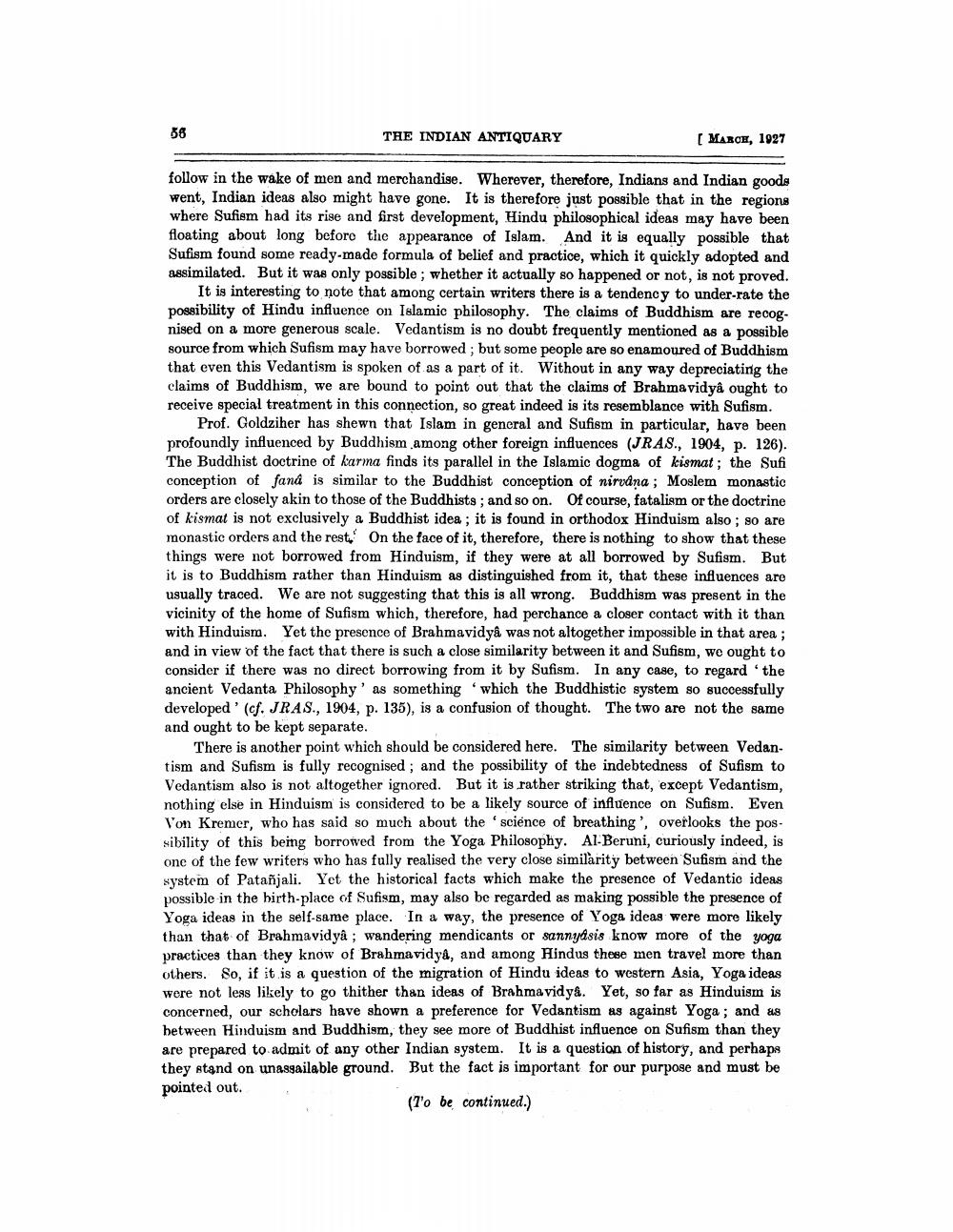________________
58
THE INDIAN ANTIQUARY
[ MARCE, 1927
follow in the wake of men and merchandise. Wherever, therefore, Indians and Indian goods went, Indian ideas also might have gone. It is therefore just possible that in the regions where Sufism had its rise and first development, Hindu philosophical ideas may have been floating about long before the appearance of Islam. And it is equally possible that Sufism found some ready-made formula of belief and practice, which it quickly adopted and assimilated. But it was only possible; whether it actually so happened or not, is not proved.
It is interesting to note that among certain writers there is a tendency to under-rate the possibility of Hindu influence on Islamic philosophy. The claims of Buddhism are recognised on a more generous scale. Vedantism is no doubt frequently mentioned as a possible source from which Sufism may have borrowed; but some people are so enamoured of Buddhism that even this Vedantism is spoken of as a part of it. Without in any way depreciating the claims of Buddhism, we are bound to point out that the claims of Brahmavidyâ ought to receive special treatment in this connection, so great indeed is its resemblance with Sufism.
Prof. Goldziher has shewn that Islam in general and Sufism in particular, have been profoundly influenced by Buddhism among other foreign influences (JRAS., 1904, p. 126). The Buddhist doctrine of karma finds its parallel in the Islamic dogma of kismat; the Sufi conception of fand is similar to the Buddhist conception of nirvana ; Moslem monastic orders are closely akin to those of the Buddhists; and so on. Of course, fatalism or the doctrine of kismat is not exclusively a Buddhist idea; it is found in orthodox Hinduism also; so are monastic orders and the rest. On the face of it, therefore, there is nothing to show that these things were not borrowed from Hinduism, if they were at all borrowed by Sufism. But it is to Buddhism rather than Hinduism as distinguished from it, that these influences are usually traced. We are not suggesting that this is all wrong. Buddhism was present in the vicinity of the home of Sufism which, therefore, had perchance a closer contact with it than with Hinduism. Yet the presence of Brahmavidyâ was not altogether impossible in that area; and in view of the fact that there is such a close similarity between it and Sufism, we ought to consider if there was no direct borrowing from it by Sufism. In any case, to regard the ancient Vedanta Philosophy as something which the Buddhistic system so successfully developed ' (cf. JRAS., 1904, p. 135), is a confusion of thought. The two are not the same and ought to be kept separate.
There is another point which should be considered here. The similarity between Vedantism and Sufism is fully recognised ; and the possibility of the indebtedness of Sufism to Vedantism also is not altogether ignored. But it is rather striking that, except Vedantism, nothing else in Hinduism is considered to be a likely source of influence on Sufism. Even Von Kremer, who has said so much about the science of breathing', overlooks the possibility of this being borrowed from the Yoga Philosophy. Al-Beruni, curiously indeed, is one of the few writers who has fully realised the very close similarity between Sufism and the system of Patañjali. Yet the historical facts which make the presence of Vedantic ideas possible in the birth-place of Sufism, may also be regarded as making possible the presence of Yoga ideas in the self-same place. In a way, the presence of Yoga ideas were more likely than that of Brahmavidya; wandering mendicants or sannydsis know more of the yoga practices than they know of Brahmavidya, and among Hindus these men travel more than others. So, if it is a question of the migration of Hindu ideas to western Asia, Yoga ideas were not less likely to go thither than ideas of Brahmavidya. Yet, so far as Hinduism is concerned, our scholars have shown a preference for Vedantism as against Yoga ; and as between Hinduism and Buddhism, they see more of Buddhist influence on Sufism than they are prepared to admit of any other Indian system. It is a question of history, and perhaps they stand on unasgailable ground. But the fact is important for our purpose and must be pointed out.
(To be continued.)




